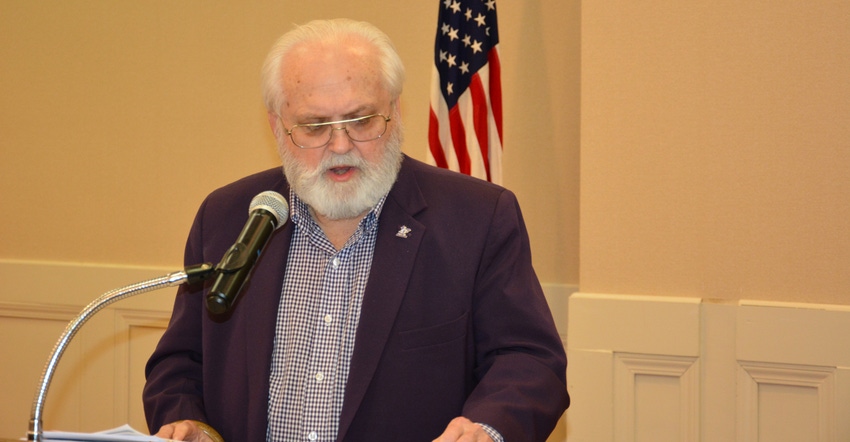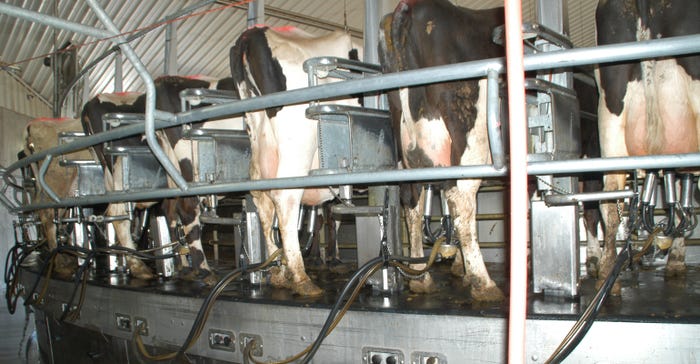
When Kansas State University professor emeritus Barry Flinchbaugh is the keynote speaker, you can expect to hear exactly what he thinks with no beating around the bush. And that’s just what the audience at the Kansas Commodity Classic in Manhattan, Kan., heard on Jan. 26.
“We’ve got a solid Kansas delegation with Sen. Moran and Sen. Roberts, and with Dr. Marshall we have a member on the House Ag Committee again,” he said. “If the other 49 states had the kind of delegation Kansas does, there’d be a lot fewer problems. But unfortunately, they don’t.”
Flinchbaugh warned his audience they might not agree with everything he had to say.
“This is ag policy under the Trump administration, which is to say the Age of Uncertainty and the Age of Twitter,” he said. “So you might not agree with all I say. If I thought you would, I’d rewrite my speech.”
Flinchbaugh, who has been an ag policy adviser for more than 50 years, said there are some words that are no longer in the lexicon — words like logic, stability, and consistency.
He gave the Trump administration good marks for the pick of Sonny Perdue as ag secretary and for deregulation. Flinchbaugh said the 2018 Farm Bill so far is OK, but immigration and trade are total failures.
“There is a big lesson that needs to be learned or re-learned,” he said. “This is a global economy and we aren’t going back. In 1960, about 9% of our GDP came from trade. In 2016, it was 24%. It doesn’t matter what the isolationist and the right wingnuts in Congress think they want, that’s the way it is.”
Flinchbaugh, who has met every president since Harry Truman and worked on every farm bill since 1976, was a key adviser to Sen. Pat Roberts on the revolutionary 1996 Freedom to Farm Bill. The 2018 Farm Bill won’t be revolutionary, he says, and Roberts agrees.
“We’re actually in a good position to be debating a farm bill,” he said. “I’d much rather be debating when prices are down than when prices are great. You tend to get the support that’s seen as needed when the debate is going on.”
He said he expects crop insurance to be maintained, and farmers to still have a choice between price-based or revenue-based coverage.
“This year will be about modifying the current bill some and making it more workable with some updates,” he said. “If we come out flat for money, with just what we have now, we’ll be fortunate. We’re going to have to put more money in the dairy program and cotton needs new money if they want back in the program.”
Just get past the nonsense of separating food stamps from Farm Bill
Crop insurance and food stamps are in a budgetary trade-off position and you need them to go together to get either done successfully, Flinchbaugh said.
“We’ve been through the nonsense of having Congressmen fall for the idea of separating the two,” he said. “If you take Food Stamps out of the bill, then that’s the last Farm Bill you’ll see. Urban congressmen don’t have any reason to support crop insurance without a nutrition program. The two have got to stay together.”
Means testing is a dumb idea
Flinchbaugh said the people who want to establish means testing or put limits on crop insurance are simply proving that they don’t understand how insurance works.
“If you are talking means testing then you don’t understand crop insurance or auto insurance or health insurance or any other insurance,” he said. “What you need for insurance to work is the biggest risk pool possible, populated by a lot more-low risk people than high-risk people. If you take the big guys out of the pool, then you are going to raise the price for the small guys and eventually they aren’t going to be able to stay in the game.”
He said punitive measures against people who need food support — such as the popular suggestion that they should be required to pass a drug test — will also backfire.
“You’ve got people on the other side saying if food stamp recipients need to be drug-tested, then so do farmers getting subsidies for crop insurance,” he said. “It’s a no-win position.”
The elephant in the room is trade policy
The thing that moves agricultural products is markets, Flinchbaugh insisted. Having markets means exports to countries that need the food American farmers produce and that means having trade agreements.
That’s a lesson that somebody needs to teach the Trump administration, Flinchbaugh said.
After pulling out of the Trans-Pacific Partnership five days into office without a single conversation with anyone who understands the value of trade to agriculture and threatening to pull out of NAFTA, Flinchbaugh, who is not known for a generous grading curve, gives Trump an F on trade policy.
Ag exports declined in 2017 and uncertainty, especially surrounding NAFTA, is likely to push markets even lower.
“NAFTA has created good jobs in this country,” Flinchbaugh said. “It works for the U.S., for Mexico and for Canada. The U.S., sells more corn, beef, pork and soy to Mexico and Canada than to anyone. If we pull the plug on NAFTA, we lose those markets to Brazil, Argentina and Europe. We simply cannot let that happen.”
Following his attendance at the economic summit in Davos, Switzerland, Trump tweeted about maybe “rethinking” TPP, something that is probably too late for the U.S., considering other countries have moved ahead on finalizing the agreement without the U.S.
“TPP was probably the most lucrative bill for farmers in my lifetime,” Flinchbaugh said. “It put the U.S. in a strong, countervailing position of power to China. It put two powers in the region instead of one bully. Rejecting it played right into China’s hands. We have to get across the point that multi-lateral agreements are far superior to bi-lateral agreements for farmers.”
Finally, he said, farmers and their allies must make the administration understand that U.S. farmers absolutely must export 25% of their production.
“At the end of the day,” he said, “the question is, if you don’t have exports, you need to cut ag by 25%. Which 25% do you want to put out of business?”
Agriculture needs a legal, permanent, immigrant workforce
Not a lot of American workers want to pick tomatoes, thin lettuce, harvest fruit, milk cows or process beef and chicken.
Thousands of those jobs are filled by immigrant workers, many of them without legal status for living or working in the U.S.
 IMMIGRANT WORKFORCE: When it comes to milking cows in the dairies of southwest Kansas and elsewhere across the country, the workforce is almost entirely immigrant, many of them undocumented.
IMMIGRANT WORKFORCE: When it comes to milking cows in the dairies of southwest Kansas and elsewhere across the country, the workforce is almost entirely immigrant, many of them undocumented.

“Almost 75% of our fruits and vegetables are picked by illegal immigrant workers,” Flinchbaugh told attendees. “About 50% of the milking of dairy cows is done by illegals. We don’t have any idea how many of our feedlot or meat processing workers are illegal.”
When it comes to immigration policy, these realities need to be taken into consideration, Flinchbaugh said.
“You get all this talk about H2A workers, but we don’t need seasonal workers. Cows have to be milked 365 days a year. We need permanent workers.”
The reality of the last several years has been that net migration is going south, wages are going up and labor shortages are becoming common, Flinchbaugh said.
About the Author(s)
You May Also Like




